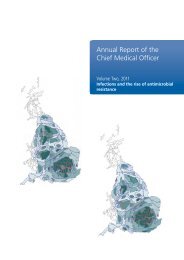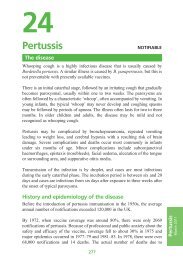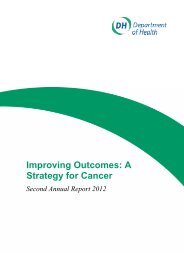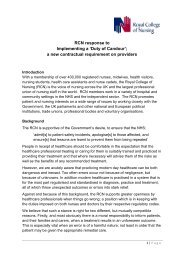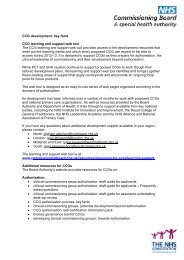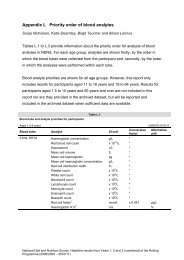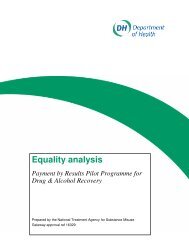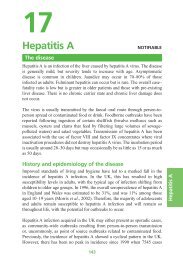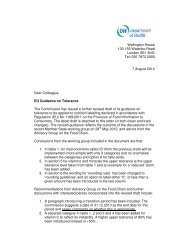No decision about me, without me - Department of Health
No decision about me, without me - Department of Health
No decision about me, without me - Department of Health
Create successful ePaper yourself
Turn your PDF publications into a flip-book with our unique Google optimized e-Paper software.
Culture change<br />
2.10 A recurring the<strong>me</strong> throughout the consultation responses was the need for a<br />
culture shift in the NHS for “no <strong>decision</strong> <strong>about</strong> <strong>me</strong>, <strong>without</strong> <strong>me</strong>” to beco<strong>me</strong> the<br />
norm:<br />
“We would support any steps towards changing the culture among health<br />
pr<strong>of</strong>essionals, so that patient involve<strong>me</strong>nt is the natural expectation.” [Sign<br />
<strong>Health</strong>]<br />
2.11 We agree that there is a significant challenge in changing the culture <strong>of</strong> both<br />
health pr<strong>of</strong>essionals, and <strong>of</strong> patients, so that both expect there to be greater<br />
patient involve<strong>me</strong>nt in <strong>decision</strong>s. So<strong>me</strong> respondents suggested the use <strong>of</strong><br />
specific training and education program<strong>me</strong>s, particularly for primary care<br />
pr<strong>of</strong>essionals, to equip clinicians with the skills necessary to help patients and<br />
the public understand their options to be involved in <strong>decision</strong>s <strong>about</strong> their care.<br />
Many clinicians already view patient involve<strong>me</strong>nt as a key part <strong>of</strong> any<br />
consultation but we want to make sure that best practice beco<strong>me</strong>s common<br />
practice.<br />
“If SDM is to beco<strong>me</strong> part <strong>of</strong> the NHS culture, it starts with the culture change<br />
in the NHS which requires education and support for NHS clinicians.” [<strong>No</strong>rth<br />
West London Hospitals Trust]<br />
2.12 This is why the Right Care Shared Decision Making Program<strong>me</strong> 12 is developing<br />
training and education resources to embed the principles <strong>of</strong> shared <strong>decision</strong>making<br />
into the curricula for a wide range <strong>of</strong> healthcare staff, including nurses,<br />
GPs, consultants and NHS managers, as well as for commissioners. In addition,<br />
the program<strong>me</strong> aims to raise awareness <strong>of</strong> shared <strong>decision</strong>-making amongst<br />
patients, their family and carers and the wider public, by working with<br />
advocates within the voluntary sector.<br />
2.13 We were pleased that the Royal College <strong>of</strong> General Practitioners are “glad to<br />
support” our proposal to work with the Royal Colleges and other organisations<br />
to explore the potential and opportunities to ensure education reinforces shared<br />
<strong>decision</strong>-making as the norm. We look forward to working with the RCGP and<br />
their colleagues to make progress in this area.<br />
2.14 So<strong>me</strong> respondents raised concerns that the ti<strong>me</strong> currently allotted to<br />
consultations was insufficient to involve patients fully in discussions and<br />
<strong>decision</strong>s <strong>about</strong> their care. There is no evidence to suggest this is the case. The<br />
12<br />
The Right Care Shared Decision Making Program<strong>me</strong> is run as part <strong>of</strong> the QIPP program<strong>me</strong>, hosted<br />
by the East <strong>of</strong> England SHA. http://www.rightcare.nhs.uk/shared<strong>decision</strong>s/<br />
9



